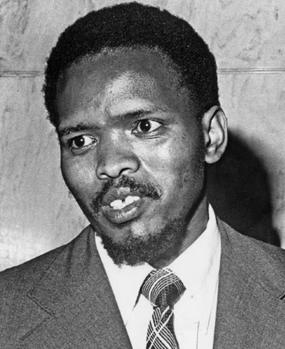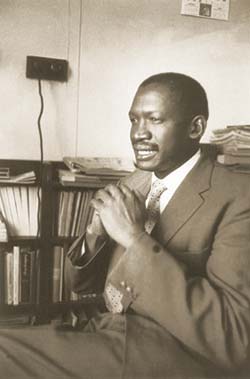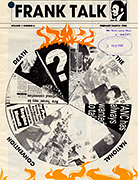
Bantu Stephen Biko OMSG was a South African anti-apartheid activist. Ideologically an African nationalist and African socialist, he was at the forefront of a grassroots anti-apartheid campaign known as the Black Consciousness Movement during the late 1960s and 1970s. His ideas were articulated in a series of articles published under the pseudonym Frank Talk.

The Pan Africanist Congress of Azania, often shortened to the Pan Africanist Congress (PAC), is a South African pan-Africanist national liberation movement that is now a political party. It was founded by an Africanist group, led by Robert Sobukwe, that broke away from the African National Congress (ANC) in 1959, as the PAC objected to the ANC's theory that "the land belongs to all who live in it both white and black" and also rejected a multiracialist worldview, instead advocating a South Africa based on African nationalism.

Robert Mangaliso Sobukwe OMSG was a South African anti-apartheid revolutionary and founding member of the Pan Africanist Congress (PAC), serving as the first president of the organization.
The Black People's Convention (BPC) was a national coordinating body for the Black Consciousness movement of South Africa. Envisaged as a broad-based counterpart to the South African Students' Organisation, the BPC was active in organising resistance to apartheid from its establishment in 1972 until it was banned in late 1977.

The Azanian People's Organisation (AZAPO) is a South African liberation movement and political party. The organisation's two student wings are the Azanian Students' Movement (AZASM) for high school learners and the Azanian Students' Convention (AZASCO) for university level students. The organisation's women's wing is Imbeleko Women's Organisation, simply known as IMBELEKO. Its inspiration is drawn from the Black Consciousness Movement inspired philosophy of Black Consciousness developed by Steve Biko, Harry Nengwekhulu, Abram Onkgopotse Tiro, Vuyelwa Mashalaba and others, as well as Marxist Scientific Socialism.

The Azanian People's Liberation Army (APLA), formerly known as Poqo, was the military wing of the Pan Africanist Congress, an African nationalist movement in South Africa. In the Xhosa language, the word 'Poqo' means 'pure'.

The Black Consciousness Movement (BCM) was a grassroots anti-apartheid activist movement that emerged in South Africa in the mid-1960s out of the political vacuum created by the jailing and banning of the African National Congress and Pan Africanist Congress leadership after the Sharpeville Massacre in 1960. The BCM represented a social movement for political consciousness.
[Black Consciousness'] origins were deeply rooted in Christianity. In 1966, the Anglican Church under the incumbent, Archbishop Robert Selby Taylor, convened a meeting which later on led to the foundation of the University Christian Movement (UCM). This was to become the vehicle for Black Consciousness.
The South African Students' Organisation (SASO) was a body of black South African university students who resisted apartheid through non-violent political action. The organisation was formed in 1969 under the leadership of Steve Biko and Barney Pityana and made vital contributions to the ideology and political leadership of the Black Consciousness Movement. It was banned by the South African government in October 1977, as part of the repressive state response to the Soweto uprising.

Mosibudi Mangena OLS is a South Africa politician, former President of the Azanian People's Organisation (AZAPO). He is also currently the honorary President of AZAPO while Nelvis Qekema is the current President, this is not unusual in the Black Consciousness Movement as was the case with Steve Biko who was also the honorary President of the Black People's Convention in the early-1970s while Winfrey Kgware was the President. He was the Minister of Science and Technology.

The National Council of Trade Unions (NACTU) is a national trade union center in South Africa.
South Africa since 1994 transitioned from the system of apartheid to one of majority rule. The election of 1994 resulted in a change in government with the African National Congress (ANC) coming to power. The ANC retained power after subsequent elections in 1999, 2004, 2009, 2014, and 2019. Children born during this period are known as the born-free generation, and those aged eighteen or older, were able to vote for the first time in 2014.

Internal resistance to apartheid in South Africa originated from several independent sectors of South African society and took forms ranging from social movements and passive resistance to guerrilla warfare. Mass action against the ruling National Party (NP) government, coupled with South Africa's growing international isolation and economic sanctions, were instrumental in leading to negotiations to end apartheid, which began formally in 1990 and ended with South Africa's first multiracial elections under a universal franchise in 1994.

Frank Talk was a political magazine established in 1984 in South Africa, and arising out of the student-led anti-apartheid movement of the 1970s and 80s.
This article covers the history of the Pan Africanist Congress of Azania, once a South African liberation movement and now a minor political party.
Curtis Nkondo was a South African diplomat, school teacher and politician with the African National Congress. Born in Louis Trichardt, Nkondo was a lifelong activist with the ANC. He was a high school teacher at Lamula High School in Meadowlands, Gauteng and eventually became the chairman of the Soweto Teachers Action Committee before being suspended for educating against apartheid. A year after the formation of the Azanian People's Organisation (AZAPO) in 1978, in September 1979, at its conference in Roodepoort the national executive was formed with Nkondo as its president. In 1980, Nkondo was suspended by AZAPO for Breach of principle.

General elections were held in South Africa on 7 May 2014, to elect a new National Assembly and new provincial legislatures in each province. It was the fifth election held in South Africa under conditions of universal adult suffrage since the end of the apartheid era in 1994, and also the first held since the death of Nelson Mandela. It was also the first time that South African expatriates were allowed to vote in a South African national election.
Molefe Pheto is a former South African musician and music teacher who, as an activist in the Black Consciousness Movement, became a political prisoner in 1975. He was a friend and spokesperson of South African President Nelson Mandela.

The Electoral Commission of South Africa (IEC) announced on 20 March 2019 that a record number of 48 parties had registered candidates for the national parliamentary election. This is 19 more parties that contested the 2014 national elections. In the provincial legislature elections, the total number of parties registering candidates were:
Pandelani Jeremia Nefolovhodwe is a South African politician and former anti-apartheid activist who served as deputy president of the Azanian People's Organisation (AZAPO) from 1992 to 2010. He represented the party in the National Assembly from 2002 to 2009 and was formerly its president from 1990 to 1992.
Daniel Ntjammu Habedi is a South African politician and former anti-apartheid activist. He is a former secretary-general of the Azanian People's Organisation and represented the party in the National Assembly from April to June 2004; his tenure was cut short by the Electoral Court's finding that the seat had been allocated to the wrong party.











